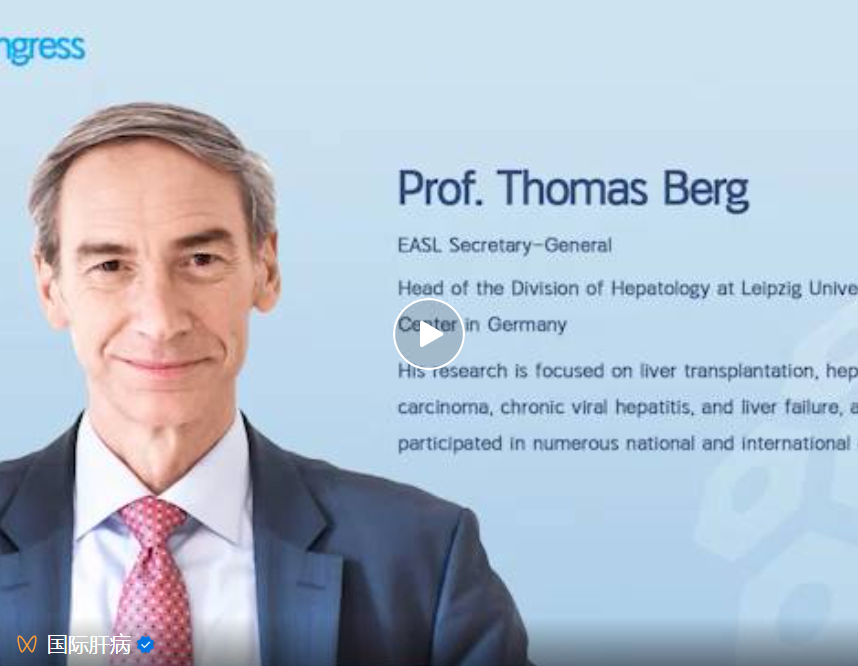当前位置:EASL-欧洲肝脏研究协会年会 » 正文
EASL秘书长专访丨Thomas Berg教授谈大会亮点、NAFLD更名及脂肪肝和乙肝的未来探索方向
—— 作者: 时间:2023-07-01 02:16:14 阅读数:
23

第58届欧洲肝脏研究学会年会(EASL2023)暨2023年EASL大会(EASL Congress 2023)为全球肝病学界带来了一场精彩纷呈的学术盛会。《国际肝病》报道团队在大会现场特别邀请到EASL秘书长、德国莱比锡大学医院肝病科主任Thomas Berg教授为我们介绍此次大会的亮点,并分享他关注的重磅研究进展,对备受瞩目的脂肪肝更名和新命名的观点,以及对脂肪肝和乙型肝炎未来研究重点和方向的思考。
《国际肝病》
作为大会秘书长,可否请您为我们介绍一下今年会议的规模以及会议的特色和亮点内容?
Thomas Berg教授:今年在维也纳举办的2023年EASL大会有近7000名与会者,观众群体相当庞大,我们的议程也极具特色,涵盖了基础科学、临床转化以及政策和公共卫生等领域。我们为患者、护士和其他相关卫生从业人员提供了各种研讨会,从不同角度讨论和解决肝病问题。
此外,我们还有一些有趣的研究摘要在最新突破(Late Breaker)专题会上进行展示。在全体大会上,一项非酒精性脂肪肝病(NAFLD)Ⅲ期临床试验报告了积极的研究结果。同时,我们还探讨了有关肝癌、病毒性肝炎消除、晚期肝病、肝硬化等方面的数据,例如,口服抗凝药物利伐沙班在改善患者生活质量方面的潜力,以及纳曲酮在治疗酒精成瘾方面的应用。此外,我们还讨论了如何通过替代疗法或干预肠道菌群来治疗已经出现失代偿的晚期肝病患者。
此次大会的内容能够给予我们很多新知识,所有注册参加大会的人员都可以随时观看相关内容或获取后期对这些数据的访问权限。此外,我们还也为杰出学者颁发奖项。我们授予了日本的Koichi Tanaka教授创新奖(Innovation Award),以表彰他在肝脏移植方面的创新。Tanaka教授是一位伟大而杰出的先驱者,他此次出席了大会,我有幸亲自将这个奖项颁给他。
We are here in Vienna in the EASL Congress 2023. We are quite happy that we have nearly 7000 attendees, so it's a wonderful audience and we have very interesting sessions here. So a very diverse program covers really the main areas from basic science, clinical translational and also to policy and public health. We have symposia for the patients, but also the nurses and allied health professionals. So you can learn from and address liver disease from every angle.
So we have some very fascinating research abstract that was presented in Late Breaker session. In General session we have a first phase three trial in nonalcoholic fatty liver disease showing positive results. Quite interesting data also about liver cancer, viral hepatitis elimination, advanced liver disease, liver cirrhosis, for instance, a role of direct acting anticoagulants that could perhaps help to improve the life of the patients. How to treat alcohol addicts with Naltrexone, the role of microbiota become more and more important. And whether you can treat patients with advanced liver disease being already decompensated with an exchange or addressing the microbiota.
It's really a very fascinating field and you can learn a lot and you can also watch on demand if you register to the Congress and you can do it even later to get access to these data. Of course, we are also awarding people and perhaps it might be interesting for you that we give a very special award, we call it an Innovation Award to Professor Koichi Tanaka from Japan for his invention of liver donor related liver transplantation where he was a wonderful and great pioneer. He attended the meeting. I could hand over it to him this award and this was a wonderful experience.
《国际肝病》
非酒精性脂肪性肝病(NAFLD)已成为慢性肝病的最主要病因。目前对于脂肪肝的新命名,NAFLD的更名,尚存争议。对此您怎么看?
Thomas Berg教授:非酒精性脂肪肝病(NAFLD)这个名称并不能准确地描述该疾病,我们也在努力地寻找一个贴切的新术语来形容这种疾病。NAFLD这个名称会让患者觉得有些莫名其妙甚至带有污名化的意味,这进一步加剧了对肝病患者的歧视,导致每位患者的病情都被认为与酒精有关。
但我们如何在全球范围内达成共识呢?因此,美国肝病学会(AASLD)、欧洲肝脏研究学会(EASL)和拉丁美洲肝病学会(ALEH)等组织,成立了一个指导委员会和德尔菲法专家组,旨在寻找共识并确定应采取的行动。共识是我们需要更改该疾病名称。因此,我们确实提出了更名的请求。
此后,经过多年的工作,我们发现应该使用一个总括性术语来描述,即脂肪变性肝病(Steatotic Liver Disease,SLD)。然后我们将SLD划分为不同的类型,其中一类现在被称为MASLD,即代谢功能障碍相关脂肪性肝病(Metabolic Dysfunction Associated Steatotic Liver Disease)。此外,我们还有其他分类,可以在德尔菲共识中找到相应的定义。
代谢异常相关脂肪性肝病(metabolic dysfunction associated fatty liver disease,MAFLD)是朝着正确方向迈出的重要一步。代谢(metabolic)是对所发生病情的重要描述,这也是当前命名过程中的共识,大多数人希望名称中包含“代谢”一词。我认为,MAFLD与MASLD的定义现在非常相似,尽管存在一些细微差别,但新的命名方法更加综合,涵盖了所有不同形式的脂肪变性肝病。
Nonalcoholic fatty liver disease was always a bit an issue that this is not really a good name, because we always try to find a name that describes what it is and not what it's not. And it also came from the patient believed that having this alcoholic sounds a bit odd in a way, also stigmatizing, and that we again link alcohol to liver, even in a situation where there's nothing to do with alcohol continues the stigma that every patient with a liver disease suffer from that is always believed it's related to alcohol.
But how to achieve agreement worldwide and therefore the major societies starting from AASLD, Latin American Association for the Study of the Liver and EASEL started to create a steering committee, a Delphi panel to try to find common sense, common ground, what should we do? And the consensus was we should change a name. So, we really asked for this.
And then it turned out many years of work that it should be an overarching term with stereotypic liver disease. And then we have subgroups and one of the subgroups is now called MASLD, so metabolic dysfunction associated stereotypic liver disease. But we have also other categories, different definition you can find in this paper.
MAFLD was an important step forward in towards this direction. Metabolic is an important description of what's going on and this was also the agreement from the current nomenclature process that most people wanted to have within the name metabolic. I think the definition between MAFLD and MASLD are now quite similar. They are small differences, but the new nomenclature is more a holistic approach covering all different forms of stereotypic liver disease.
《国际肝病》
NAFLD的防治尚存在大量未被满足的临床需求。您认为未来的重点和趋势是什么?
Thomas Berg教授:目前脂肪肝的患病人数约占总人口的30%甚至更多,而且预计这个比例还会继续增加。不过,作为肝病专家,我们有能力全面应对这种情况。
我认为最重要的是找到一种新的检测方法,来确定脂肪肝何时发展为需要由肝病专家管理的脂肪性肝病,这其中需要运用生物标志物、非侵入性检测等手段。此外,我认为若有了新的治疗方法,新检测方法的探索在诊治中的地位将更加重要。如果我们能够提供有效的治疗方案,将会彻底改变这一领域的现状。简而言之,关键是确定脂肪肝进展的时间点,以及需要专业治疗的时间点。
此外,除了我们肝病专家,这种全球性的问题还需要政策制定者的配合,以减轻脂肪性肝病的公共卫生负担并在初级保健中进行管理。
Up to 30% even more and it's expected to be more people have fatty liver disease. And as hepatologists, we can really cover all this.
So, I think the most important thing is that we have find ways to define when a fatty liver starts to become a fatty liver disease that should be managed by hepatologists here we need this biomarker, non invasive testing and so on. And I think this become even more important if we have new treatments. And if we have treatments, this will completely change the field. So, the simple message is when is a point you can define this could be a progressive liver disease, need specialized care.
The other point, and this is very important and we want to help here, but this is more a global thing where we really have to work with policymakers how to try to reduce his fatty liver disease burden and how to manage also in primary care.
《国际肝病》
目前大多数乙型肝炎患者尚不能实现治愈。乙肝新药研发以及新治疗方案探索的进展如何?您认为未来研究的重点和趋势是什么?
Thomas Berg教授:我们目前有可以相当有效地控制乙型肝炎病毒(HBV)感染的治疗方法,但要彻底治愈它还有很长的路要走。
我们对新药物有了很多了解,我们现在能够干预乙型肝炎病毒感染周期中的重要步骤。虽然现在还处于早期阶段,但在乙型肝炎治疗停止后进行了长达24至48周的随访,结果显示乙型肝炎表面抗原(HBsAg)的消除得到了维持。
这是非常好的消息,但我认为在真正拥有能够治愈大多数患者的强效治疗方案之前,我们还有很长的路要走。我认为重要的是如何及时地将抗病毒和免疫调节疗法相结合,以治愈更多的患者。
We have treatments that can control the hepatitis B virus infection quite effectively, but we are far away from having curative treatment.
And of course, we learn a lot about all these new substances and it's amazing to see what kind of drugs we have. We can now target important steps in the life cycle of hepatitis B virus infection. It's still early days, and there are data presented here with long term it's not long term follow up, but with a reasonable follow up of 24 up to 48 weeks, after treatment has been stopped, with intention to cure hepatitis B, showing HBsAg loss being hopefully sustained.
So, this is very good news, but still, I think a long way to go until we really have a very robust treatment regimen that can cure most patients. I think the big thing is really how to combine also in a timely manner, antiviral and immune modulating therapies in order to achieve cure in a higher percentage of patients.

声明:本文仅供医疗卫生专业人士了解最新医药资讯参考使用,不代表本平台观点。该信息不能以任何方式取代专业的医疗指导,也不应被视为诊疗建议,如果该信息被用于资讯以外的目的,本站及作者不承担相关责任。
标签:
访谈
专家访谈
其他肝病
发表评论
全部评论
